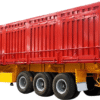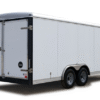Thinking about buying a cement truck? I find the prices can be quite surprising. There are so many different types available. For instance, some new ones start near $100,000. On the other hand, I’ve seen used models that might cost much less.
From my experience, the price of these giant mixers depends on many details. It matters if you want a new or used Truck. The features you pick are also important. Even the truck’s size will change the cost. But I believe there’s one overlooked detail most buyers miss…
Overview of Cement Truck Costs
If you’re looking at cement truck costs, I find prices change a lot. This depends on the truck type, its features, and if it’s new or used.
| Truck Type | Price Range | Features |
|---|---|---|
| New Standard Concrete Mixer Trucks | Starting at $100,000 | Deliver large amounts of ready-mix concrete; commonly used on construction sites. |
| Volumetric Concrete Trucks | Starting at $120,000 |
|
| Concrete Pump Trucks | $200,000 to $300,000 | Pumps and articulated booms make them suitable for delivering concrete to difficult job site locations. |
| Used Cement Truck Pricing | ||
| Available between $30,000 and $150,000. Prices depend on year, usage, brand, and condition. | ||
| Example: 2014 Oshkosh S Series | $75,000 | – |
| Example: 2004 Kenworth W900 | $34,900 | – |
Key Features & Value Considerations
From my perspective, volumetric trucks give you more for your money. They have separate material compartments. You can customize mixes and use precise admixtures. This also means you’ll have less concrete waste. I recommend them for jobs that need exact or different batch sizes.
Summary of Average Costs – New standard mixer: $100,000+ – New volumetric truck: $120,000+ – Pump truck: $200,000–$300,000 – Used trucks: $30,000–$150,000 (this varies by age/condition)I believe these prices offer a good starting point. You can use them to plan your budget for a new or used cement or concrete truck.
Types of Cement Trucks and Their Costs
The type of cement truck you pick really affects how much you’ll spend. I want to show you a breakdown of the main types of cement trucks, their common costs, and what features make them different.
Standard Concrete Mixer Trucks
Standard or transit mixe trucks are very common. I find they are often the most affordable. – New standard models cost between $90,000 and $150,000. Some advanced versions might have larger mixing drums or come from premium brands. These can go up to $200,000. – You can find many used standard trucks. Their prices range from about $30,000 up to $150,000. This price depends on age, condition, and features.
What makes them appealing: – In my experience, they are a good choice for projects needing basic mixing and delivery. – They are available in various capacities to match small or large job requirements.
Volumetric Concrete Trucks
Volumetric concrete trucks are a special type. They mix concrete on-site. I like that they give you precise control over materials. – New volumetric trucks start at around $120,000. They can go up to $250,000. Their advanced technology allows you to customize each batch right on-site. That’s why they cost more, in my opinion. – These trucks help reduce material waste. You can also make different types of concrete during one job. I find this very efficient.
Why consider a volumetric truck: – I recommend them for projects that need multiple mix designs or varying batch sizes. – They offer more precise metering and less waste than standard mixers.
Concrete Pump Trucks
Concrete pump trucks have built-in pumps and booms. These help you pour concrete in places that are hard to reach. – New concrete pump trucks cost the most. Their prices are between $200,000 and $300,000. – They cost more because of their special equipment. This equipment is great for large projects. It’s also good for sites with tricky access, based on what I’ve seen.
Who should get one: – I think they’re best suited for commercial sites or areas where direct pouring isn’t possible.
Price Range Overview by Truck Type
| Truck Type | New Price Range | Used Price Range | Notable Features |
|---|---|---|---|
| Standard Mixer | $90,000–$200,000 | $30,000–$150,000 | Basic mixing, various sizes and brands |
| Volumetric Mixer | $120,000–$250,000 | $40,000–$180,000 | On-site mixing, multiple batch options |
| Pump Truck | $200,000–$300,000 | $70,000–$200,000 | Pump and boom for difficult jobsite access |
Key Factors Influencing Cement Truck Prices
- Truck size and capacity: From my experience, larger trucks and higher load capacities mean higher costs.
- Special features: If a truck has added technology, like volumetric mixing or pumping equipment, it will cost more. I’ve noticed this consistently.
- Condition and age: Used trucks are cheaper. However, I always suggest you check their maintenance history and overall shape. This is very important.
Based on my experience, cement trucks can lower labor costs. They also reduce material waste and speed up projects compared to mixing on-site the old way. If a new truck is too expensive for your budget, I recommend looking at used options. Renting for short-term jobs is also a good idea to consider. Many buyers can get financing. This makes these powerful machines easier to obtain.
Factors Affecting Cement Truck Costs
I find several key things affect a cement truck’s price. If you understand these, I believe you can make better buying choices and manage your money well.
1、Truck Size and Capacity
From my experience, bigger cement trucks that carry more usually cost more. For example, a standard concrete Mixer Truck might start around $100,000. Volumetric trucks can often handle larger or different types of batches; these begin at about $120,000. If you need more capability, I notice prices will go up.
2、Truck Type and Features
I notice the truck type greatly affects the cost. Standard Mixer Trucks, volumetric mixers, and concrete pump trucks each have different price points. This is because their equipment and what they can do vary. Pump trucks that have booms and pump systems can cost between $200,000 and $300,000. I see this is because of their specialized job. Trucks that come with automated controls, advanced safety features, or fuel-saving systems will, in my opinion, cost more than basic models.
3、Brand and Manufacturer Reputation
In my view, cement trucks from top-name manufacturers often cost more than those from lesser-known brands. I think these higher prices are connected to their reliability, the warranty options they offer, and their resale value.
4、New vs. Used Trucks
Choosing between new and used can make a big difference in cost. New trucks have the highest prices. I’ve found used trucks can be much more affordable. Sometimes, you can find one for as little as $30,000. The price will depend on its year, condition, brand, and mileage.
5、Additional Equipment and Customization
I find optional features will drive up the price. These can include: – Technologies for automation and to improve efficiency – Systems for remote fleet monitoring – Enhanced safety systems – Customizations made for your unique job needs
6、Delivery and Operational Factors
I also see other operational items affecting total truck costs: – Delivery distance: You will face extra charges if trucks need to be transported a longer distance to your site. – Site accessibility: If your site is hard to reach or in a remote location, I’ve seen this often means additional surcharges. – Fuel prices: Rising fuel costs will influence both the initial delivery fees and your ongoing operational expenses. I suggest keeping an eye on this.
7、Financing and Purchase Options
How you decide to pay for the truck will also change the total cost. I often see these common options: – Paying the full amount in cash upfront. – Business loans. Based on my experience, these often have 5–7 year terms and may require you to offer collateral. – Leasing and rentals. I recommend these options if you have limited cash for an upfront payment or if you only need the truck for short-term projects.
8、Batch Size and Concrete Specifications
If you order large volumes of concrete, you might get a better price per yard. The type of concrete also changes the final price. For example, a basic 3000 PSI mix will cost differently than specialty mixes or those that need additives. Add-ons such as reinforcement fibers, accelerators, or retarders will, in my experience, raise your total costs.
9、Timing and Wait Times
I know cement trucks have a limited time window for unloading. If there’s extra wait time on site, this will lead to additional fees. This can impact your project budget if delays happen, so I advise planning carefully.
I suggest you weigh all these factors. Consider everything from the truck’s type and size to its features, your purchase options, and the operational details. By doing this, I believe you can better estimate your ideal cement truck cost and avoid unexpected expenses down the line.
Buying vs. Leasing vs. Renting a Cement Truck
If you’re thinking about getting a cement truck for your business, I see three main ways you can go: buying, leasing, or renting. I find each way has its pros and cons. These can affect your project costs, how flexible you are, and what you get in the long run.
Buying a Cement Truck
Buying a cement truck, whether it’s new or used, means you’ll need a good amount of money at the start. From my experience, new cement trucks cost a lot, so you’ll need to plan your money well. I’ve seen used cement trucks usually go for $30,000 to $90,000; the price changes based on how old they are and what shape they’re in.If you plan to use the truck a lot for many years, owning it can save you money in the long run, in my opinion. You’ll be responsible for all the upkeep and repairs. So, I suggest you remember to include ongoing costs for insurance, storage, and new parts.I believe buying is a good idea if your business often handles big construction jobs. You can use it as much as you want, and you won’t have to think about when a rental period ends.I always tell people to think about other costs too. These include insurance policies, finding a safe place to keep the truck, ongoing upkeep, and replacing parts as time goes on.
Leasing a Cement Truck
I see leasing as a middle ground between buying and renting. It lets you use a cement truck for a long time without paying a huge amount upfront.Usually, with leasing, you avoid a big down payment. I find that monthly payments are often less than buying it straight out. This can be good for businesses that need to manage their cash carefully.If you want to lease, I recommend you look for good leasing companies. Compare what they offer and how much they charge. Then, get in touch with them for quotes and to see if trucks are available. I’d advise you to look carefully at how long the lease is, how you’ll pay, and if regular upkeep is part of the deal.I think it’s important to consider a few things: any costs at the start, your monthly payments, extra fees, how much you can use the truck, who handles upkeep, what insurance you need, and if you’ll pay a penalty for ending the lease too soon.
Renting a Cement Truck
In my view, renting works well if your business needs a truck for just a short time or now and then. Daily rental costs for basic cement trucks usually begin around $400–$500. They can go up to $1,200 or even more depending on the truck’s size, how much it can carry, and its features.I’ve noticed that smaller trucks (4–6 cubic meters) cost less than the bigger ones (8–12 cubic meters).You might have other costs too. These can include fees for a driver, charges for getting rid of leftover concrete, and delivery or pickup fees, particularly if the location is far away. I always check for these.I’ve seen some companies let you rent for half a day, but most want you to rent for a full day at least. For longer projects, you can often find weekly and monthly rates. I believe these can sometimes be a better deal.One good thing is that the rental company often takes care of upkeep and repairs. This can give you peace of mind and help avoid surprise costs, from my perspective. Also, when you rent, I find you can choose different equipment if your project needs change.
Key Decision Factors
I suggest you think about these points: – How often and for how long will your projects need a truck? – What’s your budget, and how do you want to manage your cash flow? – Do you need the option to easily change to different truck types or sizes? I think this is important for some. – Can you take care of regular upkeep and repairs yourself? – Do you have a safe place to store a truck if you own or lease it? – Think about taxes too. I always suggest talking to your accountant when you’re deciding between buying or leasing.
So, I recommend you pick the option—buying, leasing, or renting—that best matches what your projects need, your money situation, and your business goals for the long haul. That way, you’ll find what works best for your budget.
Financing Options for Cement Trucks
If a cement truck costs too much for your business upfront, I find financing is a smart way to manage this big purchase. It also helps keep your cash flow healthy. Lenders and finance companies today have many loan and lease choices. I believe these can fit what you need, whether you’re looking at a new or used cement truck.
Common Cement Truck Financing Solutions
- Loans and Security Agreements: With traditional loans, you can finance up to 100% of the cement truck price. Repayment periods span from 24 to 72 months, with interest rates starting as low as 3.25%. The truck itself often secures the loan.
- TRAC (Terminal Rental Adjustment Clause) Lease: I notice this lease is quite popular for commercial trucks. It lets you set a future value for the truck at the end of the lease. This can mean your payments each month are lower.
- FMV (Fair Market Value) Lease: From my perspective, FMV leases offer good flexibility. At the lease’s end, you can buy the cement truck at its fair market price. You could also return the truck. Another option I like is upgrading to newer equipment.
- Installment Lease: I find this is like an equipment loan, but it’s set up as a lease. You often get options to purchase the truck fully when the lease finishes.
- Equipment Lease: In my experience, these leases often have flexible buyout terms. You might also be able to add equipment or make an upgrade during your lease.
Key Benefits and Features
- Flexible Repayment Terms: I recommend you pick from terms of 24, 36, 48, 60, or 72 months. This helps you find payments each month that suit your business’s cash flow.
- Fast Approval and Funding: I’ve seen many lenders, such as TopMark Funding and Crest Capital, give pre-approvals for up to $250,000. Sometimes this happens in as little as 24 hours. Some do not require a hard credit inquiry, so your credit score is not affected during pre-approval.
- Low Credit Barriers: I believe financing for cement trucks is open to most businesses. This holds true even if you have less-than-perfect credit. The vehicle itself often secures the loan or lease.
- Potential Tax Advantages: If you finance or lease, you might be able to deduct payments as a business expense. I suggest looking into Section 179 accelerated depreciation too, as you could qualify.
- Buyout and Upgrade Options: I’ve found many lease agreements include end-of-term buyout options. They also allow you to upgrade your equipment before your lease ends.
Typical Financing Scenarios
For instance, you could lease a new cement truck for 60 months at 4% interest. I’d ensure there are buyout options after the term.Alternatively, you might finance a used cement truck for 36 months at a competitive rate. This could cover 100% of the purchase price.You could also get up to $250,000 to fund a cement truck purchase. This approach helps you avoid tying up other business credit lines.
Top Lenders and Financing Programs
- Trans Lease: I know Trans Lease offers multiple lease types. They also have truck-specific loans for the concrete industry.
- TopMark Funding: TopMark Funding is, in my experience, known for fast approvals without a hard inquiry. They offer flexible loan and lease options.
- Crest Capital: I see Crest Capital providing both leases and loans for small businesses. They focus on speed and offer competitive rates.
- Equify Financial: Equify Financial, I understand, specializes in direct financing. This is for cement trucks and related equipment.
- Crestmont Capital: Crestmont Capital offers flexible terms and low rates, starting from 3.25%. I think they are a good choice as they have wide eligibility for various credit scores.
Benefits Over Outright Purchase
- Improved working capital: I believe it improves your working capital. You spread payments out. This leaves your money available for day-to-day operations or other investments.
- Access to newer, more capable trucks: You can get newer, better trucks. In my opinion, leasing makes regular upgrades affordable. These plans often include maintenance.
- Keeps general credit lines free: This type of financing is specific to the equipment. So, I find it helps keep your main business credit lines open, as you don’t use them all up.
Summary of Financing Types: – Loan & security agreement – TRAC lease – FMV lease – Installment lease – Equipment leaseTo pick the best financing, I want you to think about your company’s financial health and credit. Also, consider what specific equipment you need. I recommend you talk with an expert in commercial vehicle finance. They can help find a cost-effective and flexible solution for your business.
Key Takeaways: Cement Truck Cost Breakdown
From my experience, if you’re looking at the total cement truck cost, I think you should consider several important things. These factors affect your budget and business choices.
| Category | Details |
|---|---|
| Cement Truck Price Ranges | New cement trucks typically start at $100,000 for basic models.
High-end models like the 2025 Peterbilt 567 Tandem Axle 9 Yard Contech Extreme Duty mixer can cost $189,500. Used cement trucks can start as low as $30,000. Certified used trucks are often up to 6 years old with under 650,000 miles and prepared for work. |
| Key Factors That Influence Price |
|
| Rental vs. Ownership | Rental rates are high per hour and ideal for short, single projects.
Buying or leasing is more cost-effective for businesses delivering concrete regularly. |
| Real-World Cement Truck Cost Examples | New Heavy-Duty tandem axle Mixer Truck: $189,500
Standard new cement mixer truck: Starts around $100,000 Used mixers (≤6 years, low mileage, inspected): $30,000+, depending on history, condition, and equipment. |
| Other Costs |
|
Expert Opinion:
“As I see it, when looking at the concrete truck market, it’s vital to understand the total cost of ownership. This means more than just the initial purchase price. With my 15+ years in buying heavy equipment, I’ve noticed many businesses don’t account for maintenance costs. These costs are 6-8% of the purchase price each year. So, for a $150,000 truck, that’s about $9,000-$12,000 per year. I also advise people to consider the truck’s residual value. In my experience, quality brands like Peterbilt and Kenworth hold 15-20% more of their value after 5 years compared to manufacturers that are not as well-known. If your company handles 8 or more pours each week, I think owning a truck is financially smart. For fewer pours, I recommend leasing. I also suggest looking for options that include maintenance packages. In my view, the most careful buyers conduct a 7-year Total Cost of Ownership (TCO) analysis. I always suggest they compare at least three different truck models before making a final decision.”
———— Michael Thompson , Equipment Finance Specialist with 20 years experience in construction vehicle acquisition and fleet management
To sum up: From my perspective, cement truck costs vary quite a bit. This depends on the truck type, its features, age, and whether you buy or lease. I’ve seen used trucks provide significant savings. New models, however, give you the newest features and better reliability. If you use a truck regularly for your business, I believe owning or leasing almost always provides better long-term value than renting.
summary
I’ve looked into cement trucks and their costs. I now see this is a big decision. You can buy new or used, lease, or rent. I think each choice fits different business needs. What’s a key detail I find people miss? I suggest you figure out exactly how you’ll use the truck before you decide. From my experience, the best choice isn’t only about the price. It’s about getting a truck that fits how your business works day-to-day. I recommend you look closely at what your business needs. Also, check out all the ways to pay for it. This way, I believe you’ll make a choice that helps your business grow strong.
FAQS:
1. How much does a new cement truck cost?
A new cement truck typically costs between 150,000, depending on the brand, capacity, and additional features like advanced mixing technology or fuel efficiency.
2. What is the price range for a used cement truck?
Used cement trucks can range from 100,000, depending on age, mileage, and condition. Older models or those with high wear may cost less, while well-maintained trucks hold higher value.
3. Does the cost include the mixer drum and chassis?
Yes, most cement truck prices include both the mixer drum and the truck chassis. However, some manufacturers sell them separately, so buyers should confirm before purchasing.
4. Are there additional costs beyond the purchase price?
Yes, additional costs may include insurance, maintenance, fuel, permits, and driver wages, which can add thousands of dollars annually to operating expenses.
5. Can I lease or finance a cement truck instead of buying?
Yes, many dealers and financial institutions offer leasing or financing options, with monthly payments ranging from 3,500, depending on the loan terms and down payment.







